Catalan Independence Vote Set For October 1st, Propelling Spain Into Crisis
In less than a month, voters in the Catalan region of Spain will be voting whether to remain part of Spain or assert independence.
For decades now, the Catalan region of Spain has been the scene of a nascent independence movement which, although it has not devolved into violence in the way that the movement for independence centered in the Basque region of the country, has become seemingly louder in recent years. The movement, led in no small part by the ruling party in the region, received renewed momentum by the 2014 referendum in Scotland regarding its own bid to become independent from the United Kingdom. Notwithstanding the fact that the Scottish Referendum ended with a majority of Scots voting to remain tied to England, Wales, and Northern Ireland, the movement in Catalonia seemed to gain new strength from the mere fact that the Scots were given the opportunity to vote on their status within the U.K. Catalonia’s bid for a similar referendum, though, were rebuffed by national leaders even though regional leaders continued to push for such a vote, which under the Spanish Constitution would require permission from the national government. Those calls for a vote were largely ignored, though, and the movement itself appeared to be at a standstill due in no small part to the fact that the Spanish Constitution does not give the regional government the power to call for an independence vote and, as noted, the national government in Madrid was not at all interested in letting such a vote proceed forward.
Since then, the Catalan bid for independence seemed to be pushed to the backburner, at least as far as news coverage from outside of Spain would seem to indicate. This year, though, the movement has seen a distinct acceleration in activity and the issue now appears to be headed for something of a crisis point in less than a month. Earlier this year, for example, Catalan President Carles Puigdemont vowed that there would be a vote on independence regardless of what the government of Madrid might say and planning for just such an event moved forward as the summer progressed. Last week, the Catalan government announced that the referendum, which it pledged would be binding notwithstanding the fact that this would fly in the face of what appears to be the clear language of the Spanish Constitution, would be held on October 1st, less than a month away.
As a result of all of this, Spain appears headed for a crisis that will depend in no small part on how the referendum turns out:
BARCELONA — The accelerating battle over Catalonia’s status hit warp speed this week.
Catalan lawmakers voted to go ahead with an Oct. 1 referendum on separating from Spain. Spain’s constitutional court declared the vote suspended. And Catalan politicians said they would proceed anyway.
On Monday, Catalonia’s national day, hundreds of thousands of independence-minded citizens are expected to take to the streets of Barcelona in a show of force, further roiling the waters.
If it all sounds like a recipe for an unpredictable and chaotic political crisis that threatens to push Spain into uncharted territory, it is.
“This has gotten out of control,” said Javier Solana, Spain’s former foreign minister and a former secretary-general of NATO. “We’re no longer in a normal situation of political conflict, where the politicians fight but at least respect the rules of the game.”
Just weeks ago, Catalonia was the scene of a terrorist attack that killed 16 people, most of them when a van ran over pedestrians on Barcelona’s main promenade. The show of unity that followed was but a brief spasm, it turned out.
Almost immediately, Catalan and Spanish politicians — in addition to pointing fingers at each other over potential security lapses — resumed their sparring over the region’s aspirations.
Separatist leaders now face fines and suspension from office if they go ahead with the referendum, which has been declared illegal by the central government in Madrid, with the support of Spanish courts.
Some 6,000 ballot boxes have been stored in a secret location for fear that they could be confiscated by the police. The Catalan Parliament has been fast-tracking legislation amid walkouts by unionist lawmakers and objections from the assembly’s own lawyers.
Prime Minister Mariano Rajoy’s resolve stems in part from his successful resistance to Catalan pressure before, including in November 2014, when Catalonia last held a vote on separation.
But the 2014 vote was a nonbinding consultation. Just under 40 percent of voters turned out, and about 80 percent of those who did voted for independence.
This time, Catalonia’s government has promised that the referendum will be binding, even if it is declared illegal by Spain’s constitutional court and even if Catalan opponents of independence boycott it.
That has made the current round of the fight significantly riskier.
Separatism has deep historical and cultural roots in Catalonia, which has a distinct language. Monday’s Catalan national day commemorates a Catalan defeat at the hands of Madrid: the 1714 capture of Barcelona by the troops of Philip V, the first Bourbon monarch of Spain.
At one point, Spain’s national lawmakers came close to appeasing Catalan’s nationalist sentiment by allowing the region special autonomy. But when that statute was struck down by Spain’s constitutional court in 2010, the tensions came to the fore.
The dispute gathered steam during the financial crisis after Mr. Rajoy rejected a plea by Catalonia to reduce its contribution to a Spanish tax system that transfers money from wealthier to poorer areas.
The move only fueled the sense in Catalonia — Spain’s most economically powerful region — that Madrid was unfairly sucking away its wealth.
(…)
Madrid and Barcelona are now locked in a tit-for-tat struggle in which each side accuses the other of anti-democratic behavior.
The separatists say Madrid is denying Catalans the democratic right to vote on their future. Madrid says the separatists are undermining democracy by flouting court rulings and violating the constitution.
In recent days, Mr. Rajoy’s government took legal action to ensure that Spain’s judiciary declares null and void the laws that separatist lawmakers have approved before the referendum.
On Thursday, Mr. Rajoy told Catalonia’s mayors, elected officials and civil servants that their duty was to “prevent or paralyze” an illegal referendum. As Spain’s leader, he added, “I will do everything necessary without giving up anything” to stop secessionism in its tracks.
In response, Carles Puigdemont, the leader of Catalonia, told Catalan television that no politician or court in Madrid could stop the referendum.
(…)
This time the conflict is further complicated by the fragile grip that both Mr. Rajoy and Mr. Puigdemont have on power.
Mr. Puigdemont heads a separatist coalition in which his own conservative Convergence party has lost clout, in part because of arguments over secessionism but also because it has been entangled in fraud cases.
Mr. Rajoy leads a minority government in Madrid and a conservative Popular Party mired by corruption scandals.
So far, Mr. Rajoy has resisted calls by more hard-line elements of his conservative electorate to use emergency powers granted under Spain’s Constitution to seize back administrative control of Catalonia.
But he has not ruled out such a step, particularly if Mr. Puigdemont’s government declares independence unilaterally.
Either move would be a significant escalation in the standoff.
With the referendum date set, the independence movement is clearly emboldened. Tomorrow, for example, there are plans for what supporters clearly hope will be massive rallies in Barcelona and other Catalan cities in support of independence that would serve the purpose of both building support for a “yes” vote on the referendum and as a show of force of sorts to the national government. Additionally, as The New York Times reports today, many Catalans already consider Spain to be another country:
SABADELL, Spain — The challenge facing Spain as it moves to stifle the push for independence in its proud and wealthy Catalonia region goes beyond stopping plans by separatist politicians to hold a referendum on secession.
Thousands of Catalans already feel as if they live in another country in all but name.
The red and yellow Spanish flag rarely appears on balconies across the region. Instead, pro-independence flags with a white star and blue triangle and red-and yellow stripes adorn streets marked by signs printed in the distinct Catalan language that bears about as much similarity to Spanish as does Portuguese.
“We say, ‘What do they say in Spain?’ It is an expression that has been said countless times,” Montserrat Coca, the owner of a bodega who only will sell wines produced in Catalonia, said. “We are Catalans; it’s as simple as that.”
Spain’s Ministry of Justice has warned that local officials who facilitate the Oct. 1 independence vote the Catalan government called last week risk criminal prosecution, yet over 600 of Catalonia’s 948 municipalities say they intend to open polling stations. It remains unclear what position officials will take in Barcelona, the regional capital.
Coca, 59, did not always favor independence. Her transformation mirrors those of scores of people in her hometown of Sabadell and across Catalonia, where the central government in Madrid is often seen as a distant troublemaker that takes more in taxes than it returns in services and roads, schools and hospitals.
Sabadell’s pro-secession mayor, Maties Serracant, cites as a tipping point the 2010 ruling by Spain’s Constitutional Court that struck down key parts of a proposed charter that would have granted Catalonia greater autonomy and recognized it as a nation within Spain.
The court’s decision, combined with an economic downturn from which Spain has only recently recovered, pushed neutral Catalans into the self-government camp previously occupied mainly by residents with generations-long roots and for whom independence is an age-old question of identity.
“For me and for many others, the move from just feeling Catalan to wanting to live in our own country has gone very, very fast,” Serracant said. “It’s not just economic, it’s the sensation that everything that has come from Catalonia in recent years hasn’t even been heard or is just ignored.”
Many Catalans also have bitter memories of the prohibitions on the use of the Catalan language under the 1939-1975 dictatorship of Spain’s Gen. Francisco Franco. Since the return to democracy, Catalonia has achieved important levels of self-governance. School lessons are conducted mainly in Catalan. The region has its own police force, and runs a public health service.
(…)
On the outskirts of Sabadell is La Plana del Pintor, a humble neighborhood of ramshackle houses, many of which were built by migrants from southern Spain. There are no pro-independence flags on its sun-baked streets, but even here separatism has made in-roads.
Take 54-year-old Alonso Simon, a computer technician who prefers to speak Spanish instead of Catalan, enjoys traditional Spanish flamenco music and whose parents were from Madrid and southern Spain.
Simon complains that Catalonia provides more revenue to the rest of Spain than it should. He cites regular breakdowns on the train line run by Spain’s national rail service that passes through Sabadell, comparing it to the commuter train service operated by Catalonia that recently inaugurated a stop nearby.
“If they had had better infrastructure like we have now with the Catalan train, we would not have these problems,” Simon said. “The money we spend should stay here.”
Catalonia, of course, has ties to Spain that go back even further than Scotland’s ties to the United Kingdom do. In the 12th Century, Catalonia was united with the neighboring region of Aragon under unified rule, for example. Some 300 years later in the 15th Century, it became part of what eventually became the Kingdom of Spain. Notwithstanding that fact, there has long been a movement in the region that was accelerated in many respects by the manner in which Catalans were treated under the authoritarian rule of Francisco Franco from 1936 to 1975 when, as noted, the Catalan language was suppressed and the rights of the region were largely disregarded by the national government. To some degree, it seemed like the movement was largely quiet while Spain itself was led by King Juan Carlos, but the increasing political instability at the national level, reflected in both the nation’s weak economy and the fact that it has been led by a series of governments that had either only a small majority in the Parliament or were outright minority governments that relied on shifting supports to maintain power. Additionally, pro-secession movements in other parts of Europe, including not only Scotland but also the movements that led to the peaceful division of Czechoslovakia in the aftermath of the end of the Cold War, seems to have encouraged the movement. Add into that mix the rhetoric of ambitious politicians in Barcelona and the fact, as noted above, that many Catalans seem to now consider themselves Catalan first and Spanish second, and you have everything you need to bring things to a crisis point.
Much of what happens next is likely to depend on the outcome of next month’s referendum. If turnout is heavy and the pro-independence vote ends up with a strong majority of the vote, then that will likely embolden Catalan leaders to push for something that the Spanish Constitution does not even appear to allow at this point. Perhaps that will lead to a compromise wherein Catalonia gains more autonomy over its internal affairs, but it’s equally possible that it could end up emboldening pro-independence forces with consequences that are hard to predict. If turnout is low, then that would likely be seen as a defeat for the pro-independence forces since it would be easy for the national government to argue that the vote is not representative of the true nature of public opinion. Another possibility is that either independence of remaining with Spain end up with a tiny minority, which likely means a stalemate for now. The final option, of course, is that a majority of Catalan voters end up choosing to stay part of Spain. If that happens, then it would be a significant setback for pro-independence forces that could mean that the entire movement quietly fades away, at least for now.
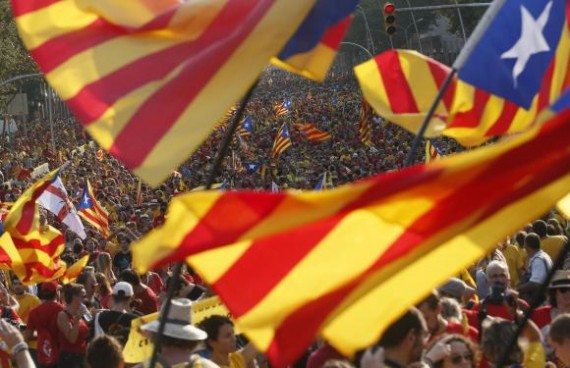

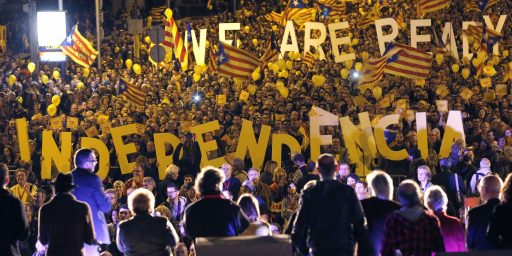
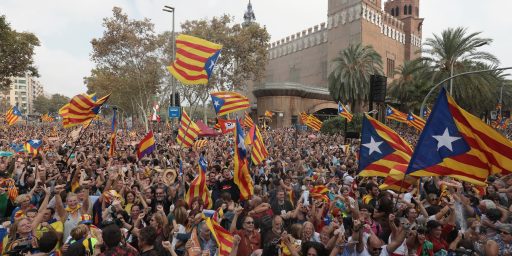
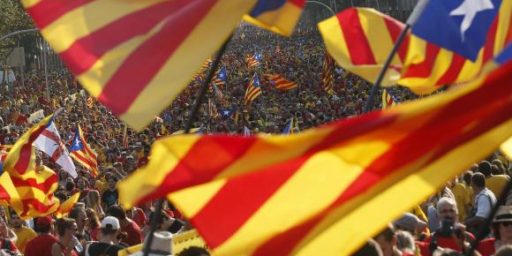
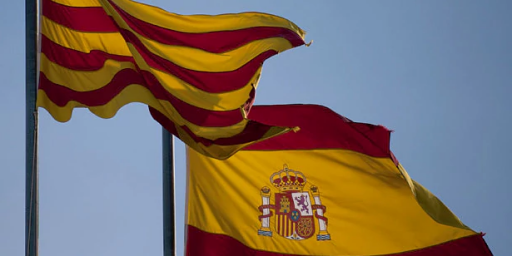
I have my doubts about the cultural explanations for this. Catalonia is the California of Spain – richer, more liberal, a net loser in terms of taxes sent to Madrid. This has the whiff of economic gerrymandering about it, cutting the winners off from the losers. I wonder how much this is just the Republican game plan – whip up the peasants with talk of culture and history, then weaponize them to serve the interests of the rich.
In today’s Europe, does any of this matter? I doubt that Catalunya will have a currency, trade policy, or military alliances that differ from the rest of Iberia. They are not going to pull out of the EU nor NATO. Now, obviously a lot of passion can be generated over differences that look pretty small to a distant observer; I would have trouble distinguishing a Croatian from a Serb even though they were shedding blood about it not too long ago. Nationalism is a way to generate a lot of passion. A little dispassionate rationality might be a good thing.
@Slugger:
The question might be, does Catalonia automatically gain entrance to the EU/NATO if they separate from Spain?
@Sleeping Dog: Actually I’m not at all sure an independent state of Catalonia would want to join the EU.
@Davebo: Tourism is an important industry in that area. At this time, a sun starved German gets on a train or highway and goes to their beaches with no passport or currency hassles. The EU is a big player on the world economic stage; life is probably better inside the community than outside it. Of course, I could be wrong. We’ll see how England fares after Brexit.
Catalonia won’t need a huge military. Staying in NATO lets them stay inside the American umbrella for expensive stuff like nuclear deterrents. They will need a navy/coast guard which might achieve efficiencies by coordinating with the other NATO members.
“Has ties” is a pretty disingenuous way of putting it. Catalunya has been under the thumb of Castille for a long time, as have the Basque provinces and Galicia and Andalusia. None of those coastal regions have much enjoyed that. Castille needs them far more than they need Castille, which is basically an arid wasteland in the middle of Iberia.
“They conquered us a long time ago” is not necessarily a reason to feel kinship or cultural unity with the conqueror. The analogy with Scotland is perhaps better than you realize.
If Catalunya opts for independence, how long before Provence holds its own referendum on whether to secede from France and join Catalunya? Language is a powerful unifying force.
@michael reynolds:
All of that and although the movement has been dormant in recent years the Basque separatist movement, albeit in a different manner, has the same grievances with respect to Madrid.
Both Catalunya and Euskadi have important language and cultural differences with Castillan Spain. I’m not how this referendum will play out, but if you visit Barcelona or Bilbao, it, the desire for separation and independence is never far from the surface.